If you need a diesel truck for towing, then you have the ability to pull tons of cargo, which means you also have the capacity to get in way over your head. Even if you don’t plan to max out your truck’s towing potential, it’s better to be safe than sorry. Here’s some advice on products that will make your towing experience less dramatic and more comfortable, both of which make towing safer for you, your family, and everyone else on the road.
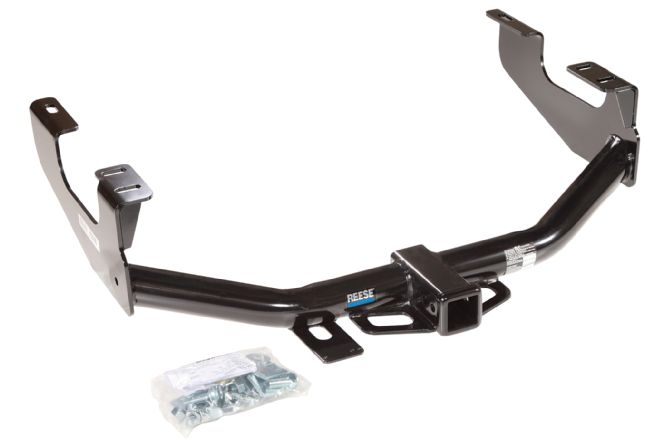
| High Capacity Hitches
High-Capacity Hitches
Most modern diesel trucks ordered with a factory tow package will include an under-bumper, or conventional, Class 4 or 5 hitch mounted to the frame, which is good for towing up to about 10,000 pounds. Even if you plan to stay within the factory guidelines, it’s always best to use a weight distribution system that places your trailer’s load evenly on the trailer ball. You’ll also need a seven-pin trailer wiring kit and a trailer brake controller if your truck is not equipped with one from the factory.
While it’s very common for drivers to surpass the bumper hitch limit, it’s a very bad idea. When you exceed the weight rating, you’re doing a lot more than ignoring a suggestion in the owner’s manual. New- vehicle engineers compute tow ratings by taking into account everything from the handling, steering, braking, and cooling, to gear strengths, bearing capacities, real-world testing, and plenty of other attributes you may not have in mind when you hook up a heavy trailer.
To properly tow a trailer that exceeds the rating of your conventional hitch, you need to step up to a gooseneck ball or fifth-wheel hitch that’s mounted between the rear framerails, directly over the rear axle. While Ford, GM, and Ram are now offering factory options for these types of hitches, you can also buy aftermarket models that offer just as much, or more capacity. Aftermarket hitches also offer plenty of additional features, including the ability to slide back to prevent the dreaded “cab crunch” where a trailer hits the truck during a sharp turn.
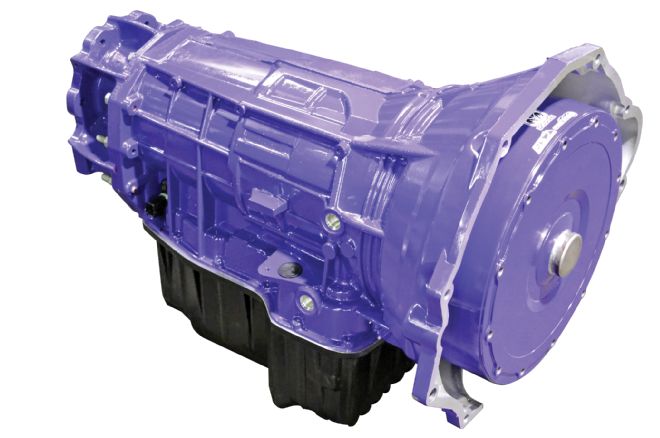
| Heavy Duty Transmissions
Transmission Toughness
Heat is one of a transmission’s most dangerous enemies—if not the most dangerous—because when parts exceed their heat limits, they are more prone to break and cause a chain-reaction disaster. While the factory heavy-duty transmissions that come with all modern diesel engines are incredible works of engineering, when they become overheated, all bets are off. So drivers who plan to tow heavy trailers must do their best to avoid excess heat and may even decide that a preventative transmission upgrade is necessary.
Two of the least expensive and most basic upgrades for a diesel transmission are the installation of a high-capacity oil pan with cooling fins, and a large auxiliary transmission fluid cooler. Another way to reduce excessive heat is by installing an aftermarket low-stall torque converter that is made with more heat-resistant materials and designed to better deal with a constant load. Drivers who know they’re going to be maxing out their towing capacity on a regular basis may want to just bite the bullet and invest in a complete transmission upgrade or replacement. Then the gearbox will be up to the task of handling extreme loads and any power upgrades that might be applied to the engine. With a new transmission, problems can be avoided and the risk of a catastrophic failure that comes at the expense of a vacation or bank account can be minimized.
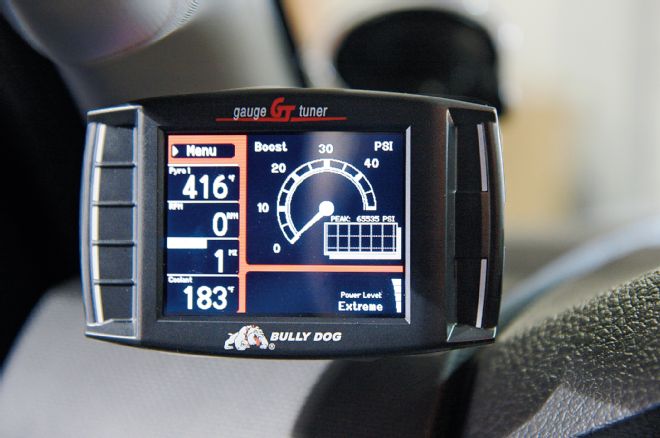
| Gearing Up For The Long Haul Bully Dog GT Tuner
Electronic Elec-Tricks
One advantage of using an electronic engine programmer is the ability to monitor multiple temperature points without the need to clutter your A-pillar or dash with numerous gauges. Of course, this is just an added bonus to the benefits of being able to reprogram your engine and transmission computers to maximize their functions while you are towing. Plus, you’ll have the ability to play with settings when your truck is not burdened with a trailer for fun on the streets, strips, or sled pulls.
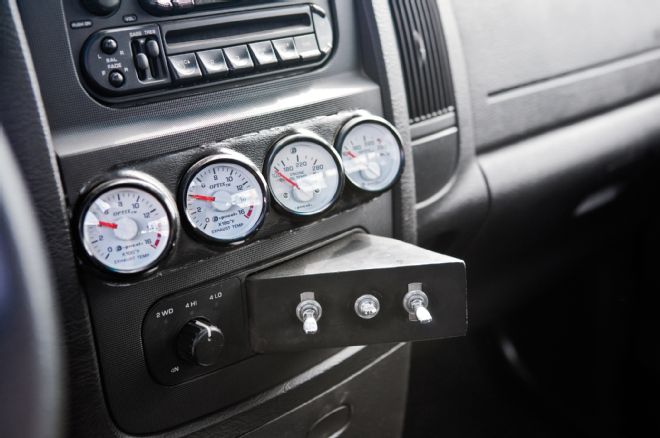
| Gearing Up For The Long Haul Guages
Gauging Good to Prevent Breaking Bad
One of the best ways to assure you don’t break your transmission or become the victim of a different sort of major breakdown is by keeping yourself informed at all times. When it comes to towing, the most important information is the temperature of parts in your drivetrain. As discussed earlier, the transmission (especially automatics, which shouldn’t exceed 220 degrees) is particularly vulnerable to heat and should be your primary concern, but there are plenty of other parts to worry about.
With a turbodiesel under a heavy load, the EGT is also incredibly important. If you let the EGT surpass 1,200 degrees for extended periods of time, you risk the turbine wheel melting and disintegrating into your exhaust system—if you’re lucky. If you’re unlucky, excessive heat can also lead to cracked valves, blown head gaskets, and internal engine damage.
Towing also puts a lot of stress on the rear axle, so it can’t hurt to keep an eye on the temperature inside your rear differential. While maximum temperatures vary depending on the gear ratio and the weight of the trailer you are pulling, it’s probably best to keep oil in the same range as the transmission fluid. The best way to ensure your gears don’t melt and meld is to install a temperature gauge and a high-capacity differential cover with heat-dissipation fins and replace the fluid regularly. Even though it’s tempting to think of an axle as a sealed unit without the need for maintenance, it’s a lot better to prevent a failure than end up with your rear wheels locking while you are towing at highway speeds.
Exhaust Exits
As mentioned earlier, towing a large trailer creates a heavy load on the engine, and that results in large amounts of heat dumping into the exhaust manifold(s). While plenty of that can be used to spin turbos, the leftover heat still needs to be expelled. Stock exhausts can be somewhat restrictive compared to aftermarket systems that can be, or even exceed, 5 inches in diameter. After the turbine has been spun, the exhaust system’s primary function is to provide a path that removes heat from the engine as quickly as possible. While older trucks can rely on massive straight-pipe systems, new laws require smog checks for diesel trucks, meaning that tampering with post-turbo emissions parts may not be an option for you. That doesn’t mean you can’t upgrade your exhaust system. But to stay legal and warranty safe, you’ll be limited to post-catalytic, and possibly pre-urea injection exhaust systems.
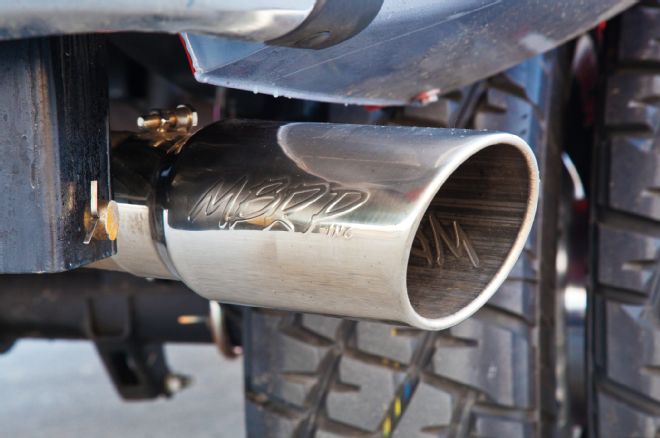
| Exhaust Systems Tip
Suspension Sweetness
While your truck’s specification sheet, or the laws for your driver’s license, may confine you to a certain trailer weight limit, that doesn’t mean you can’t improve the ride characteristics of the suspension system. You can upgrade your shock absorbers by using off-road technology (such as reservoir shocks) or stiffening the rear suspension with an add-a-leaf setup, but that’s not your only option. By taking a cue from semitrucks, you can install an airbag suspension, which not only maximizes the capacity of your suspension system, but it will also improve the ride quality and better control sway.
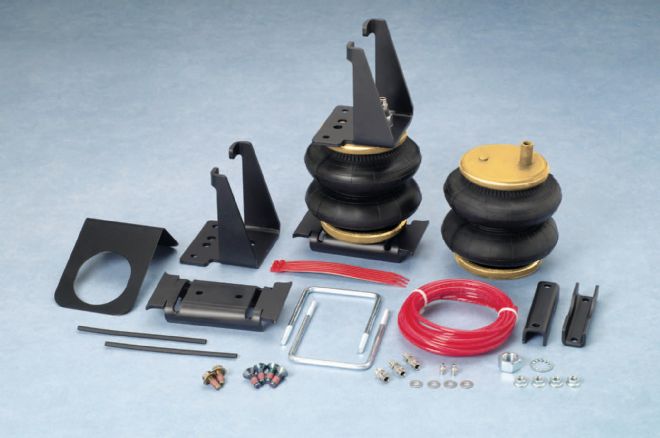
| Airbag Suspension
Braking Your Best
Factory brakes for ¾- and 1-ton trucks are hard to beat, since all of the Big Three are using large front and rear disc brakes with antilock systems as standard equipment. You can still improve the deceleration of your diesel tow rig, though, with the addition of an exhaust brake. All diesel trucks are now being sold with turbo-based exhaust brakes, but you can also add a traditional aftermarket exhaust brake, whether yours came with one from the factory or not.
With an exhaust brake installed, you can use your engine to slow your rig utilizing the compression power of the engine, saving wear and tear on the braking system on both your truck and trailer. Another braking upgrade that all trailers should have is a trailer brake emergency disconnect system. That way, if your trailer comes loose from your truck, the trailer brakes will be activated and bring it to a stop. Lastly, a trailer brake controller should be used on the tow rig to properly modulate the stopping power on trailers equipped with electric brakes.
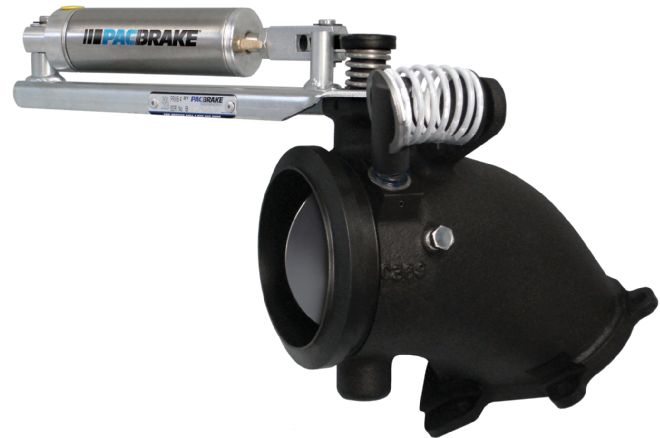
| Pac Brake Exhaust Brake
Strap Safety
Another investment that will be well worth the money is high-quality ratchet straps. By purchasing brand-new straps in multiple lengths, you can be sure your cargo always stays securely in place. This will keep the weight of what you’re transporting steady for optimal handling and ensure your cargo doesn’t end up on the road—even if you hit some rough patches of asphalt or need to make evasive maneuvers.
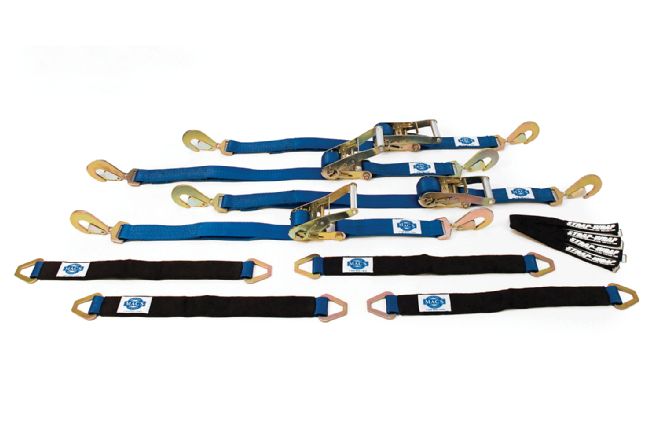
| Macs Tie Downs
Tough Tires and Work Wheels
Good tires aren’t cheap, and since trailering tires are built for work, they can seem a bit boring, but they’re very important. They not only support your cargo, but proper tires make sure your truck and trailer stay planted to the road and steer predictably. When you purchase a trailer, it may be tempting to just keep whichever tires were on it the day you bought it, but you need to make sure they can handle the duty cycle you have in mind. If you’ll be pulling a trailer with landscaping equipment around city streets, your tire needs will be different than someone who tows a large backhoe long distances on the highways. By running tires with the proper load ratings, you’ll avoid a dangerous blowout and possibly even improve your fuel economy.
Trailering wheels are another product that often gets overlooked, because it’s easy to buy a used trailer or truck and not want to add another expense. Before you put your truck and trailer to work, you’ll need to make sure the wheels are up to the task or buy some that are rated to support the weight you plan to tow. An old trailer equals old wheels, so don’t risk your entire rig on aging, rusted steelies—and make sure the bearings are in good shape, too. If you decide to get new wheels, make sure you put enough money in your budget so you can carry a spare wherever your travels take you.
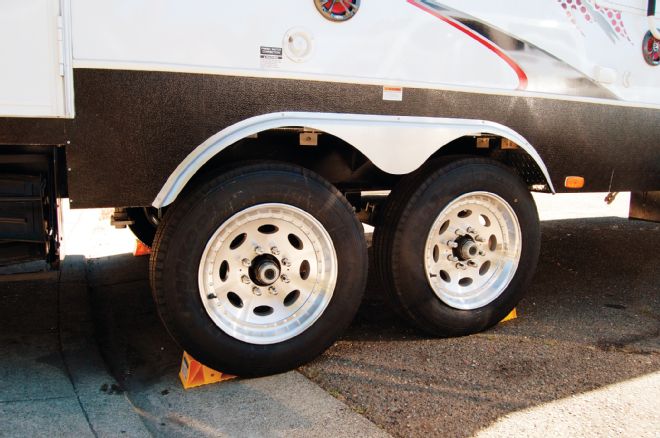
| Trailer Wheels
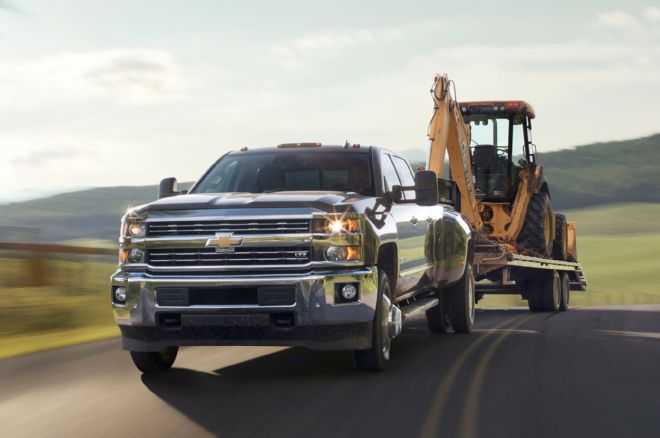
| 2015 Chevrolet Silverado 3500HD Towing
 | High Capacity Hitches
High-Capacity Hitches
Most modern diesel trucks ordered with a factory tow package will include an under-bumper, or conventional, Class 4 or 5 hitch mounted to the frame, which is good for towing up to about 10,000 pounds. Even if you plan to stay within the factory guidelines, it’s always best to use a weight distribution system that places your trailer’s load evenly on the trailer ball. You’ll also need a seven-pin trailer wiring kit and a trailer brake controller if your truck is not equipped with one from the factory.
While it’s very common for drivers to surpass the bumper hitch limit, it’s a very bad idea. When you exceed the weight rating, you’re doing a lot more than ignoring a suggestion in the owner’s manual. New- vehicle engineers compute tow ratings by taking into account everything from the handling, steering, braking, and cooling, to gear strengths, bearing capacities, real-world testing, and plenty of other attributes you may not have in mind when you hook up a heavy trailer.
To properly tow a trailer that exceeds the rating of your conventional hitch, you need to step up to a gooseneck ball or fifth-wheel hitch that’s mounted between the rear framerails, directly over the rear axle. While Ford, GM, and Ram are now offering factory options for these types of hitches, you can also buy aftermarket models that offer just as much, or more capacity. Aftermarket hitches also offer plenty of additional features, including the ability to slide back to prevent the dreaded “cab crunch” where a trailer hits the truck during a sharp turn.
| High Capacity Hitches
High-Capacity Hitches
Most modern diesel trucks ordered with a factory tow package will include an under-bumper, or conventional, Class 4 or 5 hitch mounted to the frame, which is good for towing up to about 10,000 pounds. Even if you plan to stay within the factory guidelines, it’s always best to use a weight distribution system that places your trailer’s load evenly on the trailer ball. You’ll also need a seven-pin trailer wiring kit and a trailer brake controller if your truck is not equipped with one from the factory.
While it’s very common for drivers to surpass the bumper hitch limit, it’s a very bad idea. When you exceed the weight rating, you’re doing a lot more than ignoring a suggestion in the owner’s manual. New- vehicle engineers compute tow ratings by taking into account everything from the handling, steering, braking, and cooling, to gear strengths, bearing capacities, real-world testing, and plenty of other attributes you may not have in mind when you hook up a heavy trailer.
To properly tow a trailer that exceeds the rating of your conventional hitch, you need to step up to a gooseneck ball or fifth-wheel hitch that’s mounted between the rear framerails, directly over the rear axle. While Ford, GM, and Ram are now offering factory options for these types of hitches, you can also buy aftermarket models that offer just as much, or more capacity. Aftermarket hitches also offer plenty of additional features, including the ability to slide back to prevent the dreaded “cab crunch” where a trailer hits the truck during a sharp turn.
 | Heavy Duty Transmissions
Transmission Toughness
Heat is one of a transmission’s most dangerous enemies—if not the most dangerous—because when parts exceed their heat limits, they are more prone to break and cause a chain-reaction disaster. While the factory heavy-duty transmissions that come with all modern diesel engines are incredible works of engineering, when they become overheated, all bets are off. So drivers who plan to tow heavy trailers must do their best to avoid excess heat and may even decide that a preventative transmission upgrade is necessary.
Two of the least expensive and most basic upgrades for a diesel transmission are the installation of a high-capacity oil pan with cooling fins, and a large auxiliary transmission fluid cooler. Another way to reduce excessive heat is by installing an aftermarket low-stall torque converter that is made with more heat-resistant materials and designed to better deal with a constant load. Drivers who know they’re going to be maxing out their towing capacity on a regular basis may want to just bite the bullet and invest in a complete transmission upgrade or replacement. Then the gearbox will be up to the task of handling extreme loads and any power upgrades that might be applied to the engine. With a new transmission, problems can be avoided and the risk of a catastrophic failure that comes at the expense of a vacation or bank account can be minimized.
| Heavy Duty Transmissions
Transmission Toughness
Heat is one of a transmission’s most dangerous enemies—if not the most dangerous—because when parts exceed their heat limits, they are more prone to break and cause a chain-reaction disaster. While the factory heavy-duty transmissions that come with all modern diesel engines are incredible works of engineering, when they become overheated, all bets are off. So drivers who plan to tow heavy trailers must do their best to avoid excess heat and may even decide that a preventative transmission upgrade is necessary.
Two of the least expensive and most basic upgrades for a diesel transmission are the installation of a high-capacity oil pan with cooling fins, and a large auxiliary transmission fluid cooler. Another way to reduce excessive heat is by installing an aftermarket low-stall torque converter that is made with more heat-resistant materials and designed to better deal with a constant load. Drivers who know they’re going to be maxing out their towing capacity on a regular basis may want to just bite the bullet and invest in a complete transmission upgrade or replacement. Then the gearbox will be up to the task of handling extreme loads and any power upgrades that might be applied to the engine. With a new transmission, problems can be avoided and the risk of a catastrophic failure that comes at the expense of a vacation or bank account can be minimized.
 | Gearing Up For The Long Haul Bully Dog GT Tuner
Electronic Elec-Tricks
One advantage of using an electronic engine programmer is the ability to monitor multiple temperature points without the need to clutter your A-pillar or dash with numerous gauges. Of course, this is just an added bonus to the benefits of being able to reprogram your engine and transmission computers to maximize their functions while you are towing. Plus, you’ll have the ability to play with settings when your truck is not burdened with a trailer for fun on the streets, strips, or sled pulls.
| Gearing Up For The Long Haul Bully Dog GT Tuner
Electronic Elec-Tricks
One advantage of using an electronic engine programmer is the ability to monitor multiple temperature points without the need to clutter your A-pillar or dash with numerous gauges. Of course, this is just an added bonus to the benefits of being able to reprogram your engine and transmission computers to maximize their functions while you are towing. Plus, you’ll have the ability to play with settings when your truck is not burdened with a trailer for fun on the streets, strips, or sled pulls.
 | Gearing Up For The Long Haul Guages
Gauging Good to Prevent Breaking Bad
One of the best ways to assure you don’t break your transmission or become the victim of a different sort of major breakdown is by keeping yourself informed at all times. When it comes to towing, the most important information is the temperature of parts in your drivetrain. As discussed earlier, the transmission (especially automatics, which shouldn’t exceed 220 degrees) is particularly vulnerable to heat and should be your primary concern, but there are plenty of other parts to worry about.
With a turbodiesel under a heavy load, the EGT is also incredibly important. If you let the EGT surpass 1,200 degrees for extended periods of time, you risk the turbine wheel melting and disintegrating into your exhaust system—if you’re lucky. If you’re unlucky, excessive heat can also lead to cracked valves, blown head gaskets, and internal engine damage.
Towing also puts a lot of stress on the rear axle, so it can’t hurt to keep an eye on the temperature inside your rear differential. While maximum temperatures vary depending on the gear ratio and the weight of the trailer you are pulling, it’s probably best to keep oil in the same range as the transmission fluid. The best way to ensure your gears don’t melt and meld is to install a temperature gauge and a high-capacity differential cover with heat-dissipation fins and replace the fluid regularly. Even though it’s tempting to think of an axle as a sealed unit without the need for maintenance, it’s a lot better to prevent a failure than end up with your rear wheels locking while you are towing at highway speeds.
| Gearing Up For The Long Haul Guages
Gauging Good to Prevent Breaking Bad
One of the best ways to assure you don’t break your transmission or become the victim of a different sort of major breakdown is by keeping yourself informed at all times. When it comes to towing, the most important information is the temperature of parts in your drivetrain. As discussed earlier, the transmission (especially automatics, which shouldn’t exceed 220 degrees) is particularly vulnerable to heat and should be your primary concern, but there are plenty of other parts to worry about.
With a turbodiesel under a heavy load, the EGT is also incredibly important. If you let the EGT surpass 1,200 degrees for extended periods of time, you risk the turbine wheel melting and disintegrating into your exhaust system—if you’re lucky. If you’re unlucky, excessive heat can also lead to cracked valves, blown head gaskets, and internal engine damage.
Towing also puts a lot of stress on the rear axle, so it can’t hurt to keep an eye on the temperature inside your rear differential. While maximum temperatures vary depending on the gear ratio and the weight of the trailer you are pulling, it’s probably best to keep oil in the same range as the transmission fluid. The best way to ensure your gears don’t melt and meld is to install a temperature gauge and a high-capacity differential cover with heat-dissipation fins and replace the fluid regularly. Even though it’s tempting to think of an axle as a sealed unit without the need for maintenance, it’s a lot better to prevent a failure than end up with your rear wheels locking while you are towing at highway speeds.
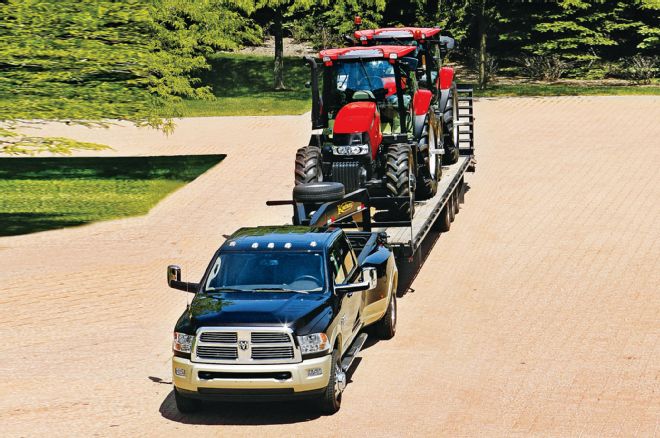
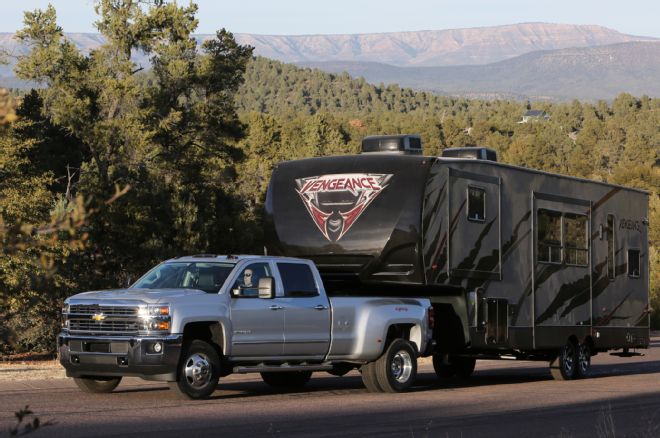
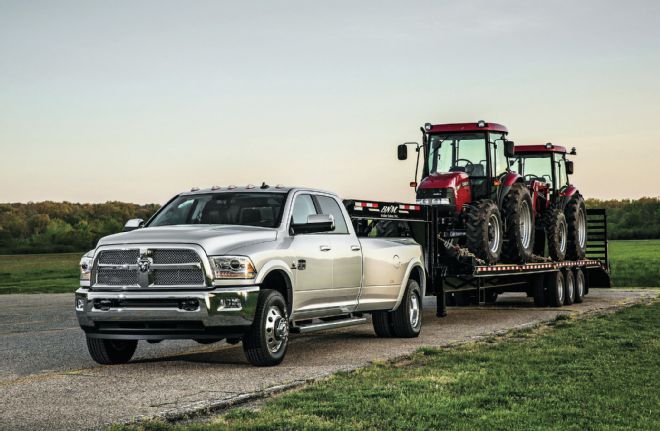
 | Exhaust Systems Tip
| Exhaust Systems Tip
 | Airbag Suspension
| Airbag Suspension
 | Pac Brake Exhaust Brake
| Pac Brake Exhaust Brake
 | Macs Tie Downs
| Macs Tie Downs
 | Trailer Wheels
| Trailer Wheels
 | 2015 Chevrolet Silverado 3500HD Towing
| 2015 Chevrolet Silverado 3500HD Towing